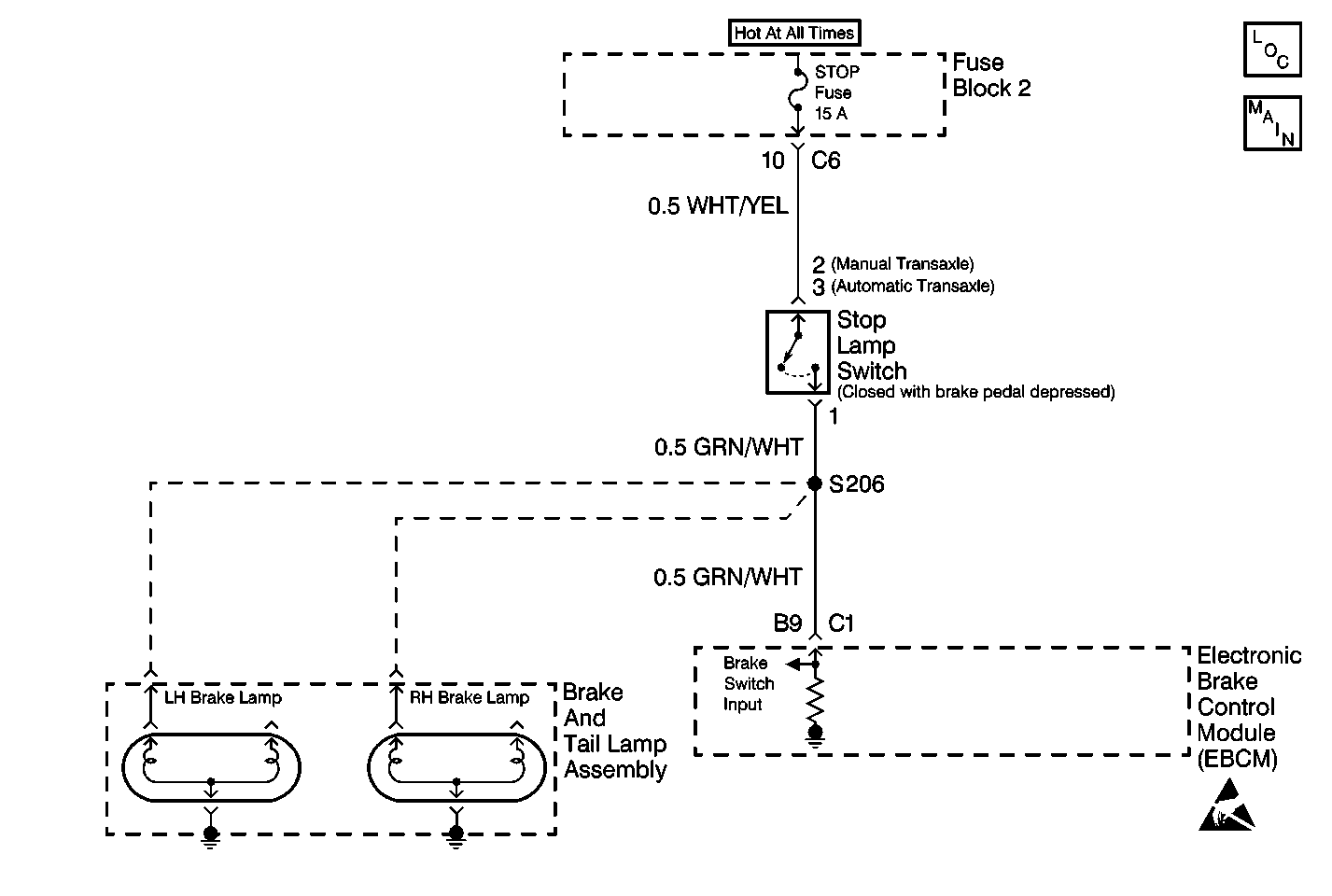
Circuit Description
This DTC is run to determine the proper operation of the stoplamp switch, which detects that the stoplamp switch is closed at all times or there is a short to voltage in the stoplamp switch input circuit to the EBCM.
Conditions for Setting the DTC
| • | DTC C1294 can set if the vehicle's speed is greater than 40 km/h (25 mph). |
| • | A malfunction exists if the brake was always on during two consecutive drive cycles. |
Action Taken When the DTC Sets
| • | A malfunction DTC stores. |
| • | ABS operation remains functional. |
Conditions for Clearing the DTC
| • | The condition responsible for setting the DTC no longer exists and the Scan Tool Clear DTCs function is used. |
| • | 100 drive cycles pass with no DTCs detected. A drive cycle consists of starting the vehicle, driving the vehicle over 16 km/h (10 mph), stopping and then turning the ignition OFF. |
Diagnostic Aids
Inspect for the following when diagnosing this system:
| • | Stoplamp switch out-of-adjustment |
| • | Faulty stoplamp switch (contacts always closed) |
| • | Stoplamp switch input circuit shorted to battery |
Use the enhanced diagnostic function of the Scan Tool in order to measure the frequency of the malfunction.
Test Description
-
This test isolates the cause of the malfunction to either a faulty or misadjusted brake switch, or a short to voltage in the brake switch circuit.
-
This test checks for a resistive short to voltage in the brake switch circuit.
-
This test determines if the malfunction is caused by the EBCM.
Step | Action | Value(s) | Yes | No | ||||||
|---|---|---|---|---|---|---|---|---|---|---|
|
Important: Zero the J 39200 test leads before making any resistance measurements. Refer to the J 39200 user's manual. | ||||||||||
1 | Was A Diagnostic System Check-ABS performed? | -- | ||||||||
2 |
Are the rear brake lamps on? | -- | ||||||||
Disconnect the stoplamp switch connector. Are the rear brake lamps on? | -- | |||||||||
4 | Inspect the adjustment of the stoplamp switch. Is the stoplamp switch adjusted correctly? | -- | ||||||||
Do not start the engine. Is the voltage within the specified range? | 0-1 V | |||||||||
6 |
Is there evidence of poor terminal contact, terminal corrosion, or damaged terminals? | -- | ||||||||
Do not start the engine. Does DTC C1294 set as a current DTC during the last three drive cycles? | -- | |||||||||
8 | Repair the short to voltage in the WHT/YEL wire between the fuse block 2 and the stop lamp switch or the GRN/WHT wire between the stop lamp switch and the EBCM. Refer to Wiring Repairs in Wiring Systems. Is the repair complete? | -- | -- | |||||||
9 | Adjust the stoplamp switch. Refer to Stop Lamp Switch Adjustment in Hydraulic Brakes. Is the repair complete? | -- | -- | |||||||
10 | Replace the stoplamp switch. Refer to Stop Lamp Switch Replacement in Hydraulic Brakes. Is the repair complete? | -- | -- | |||||||
11 | Replace all of the terminals and connectors that exhibit the following conditions:
Refer to Connector Repairs in Wiring Systems. Is the repair complete? | -- | -- | |||||||
12 | Replace the EBCM. Refer to Electronic Brake Control Module Replacement . Is the repair complete? | -- | -- | |||||||
13 | The malfunction is intermittent or is not present at this time. Refer to Diagnostic Aids for more information. Is the action complete? | -- | System OK | -- | ||||||
